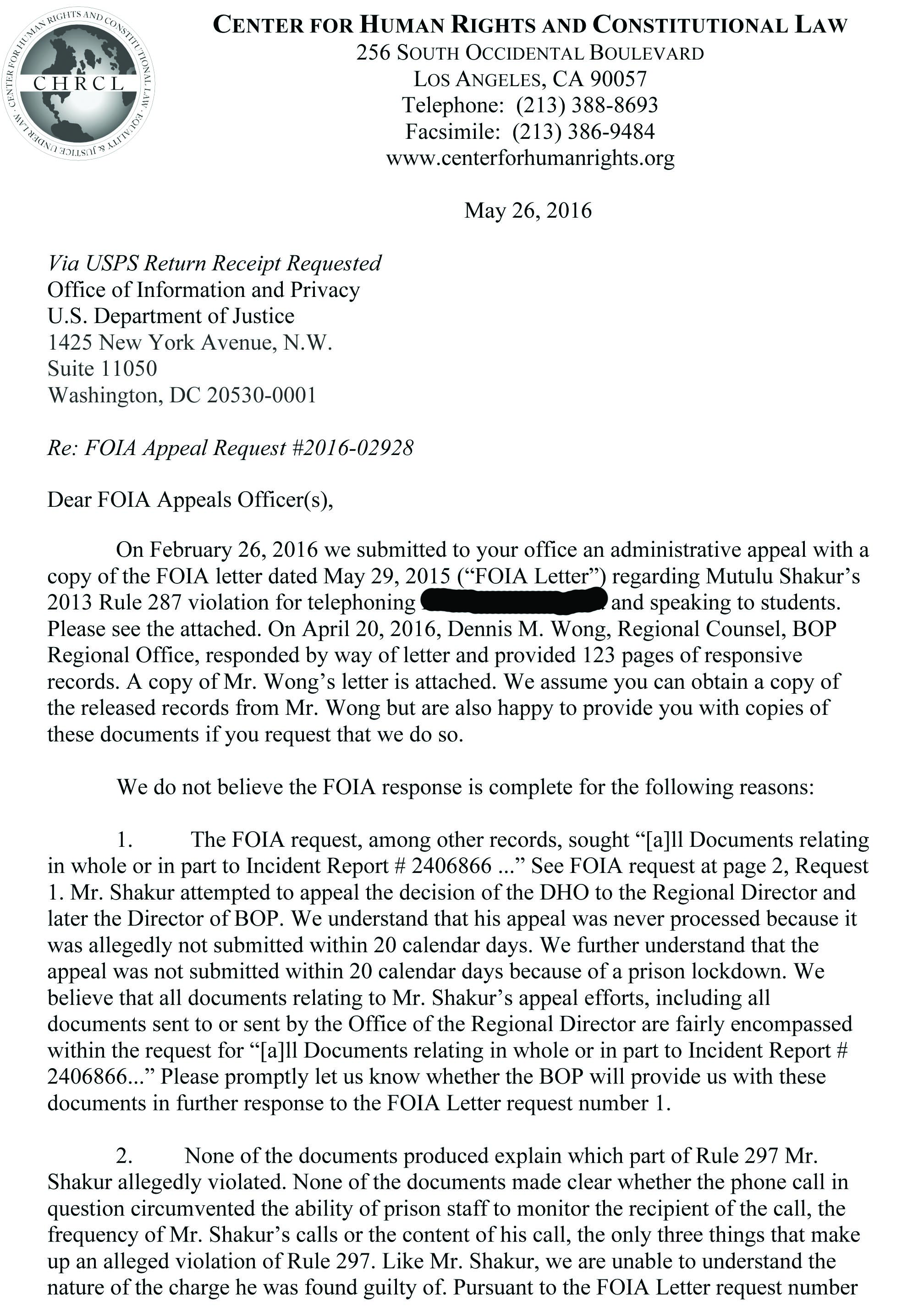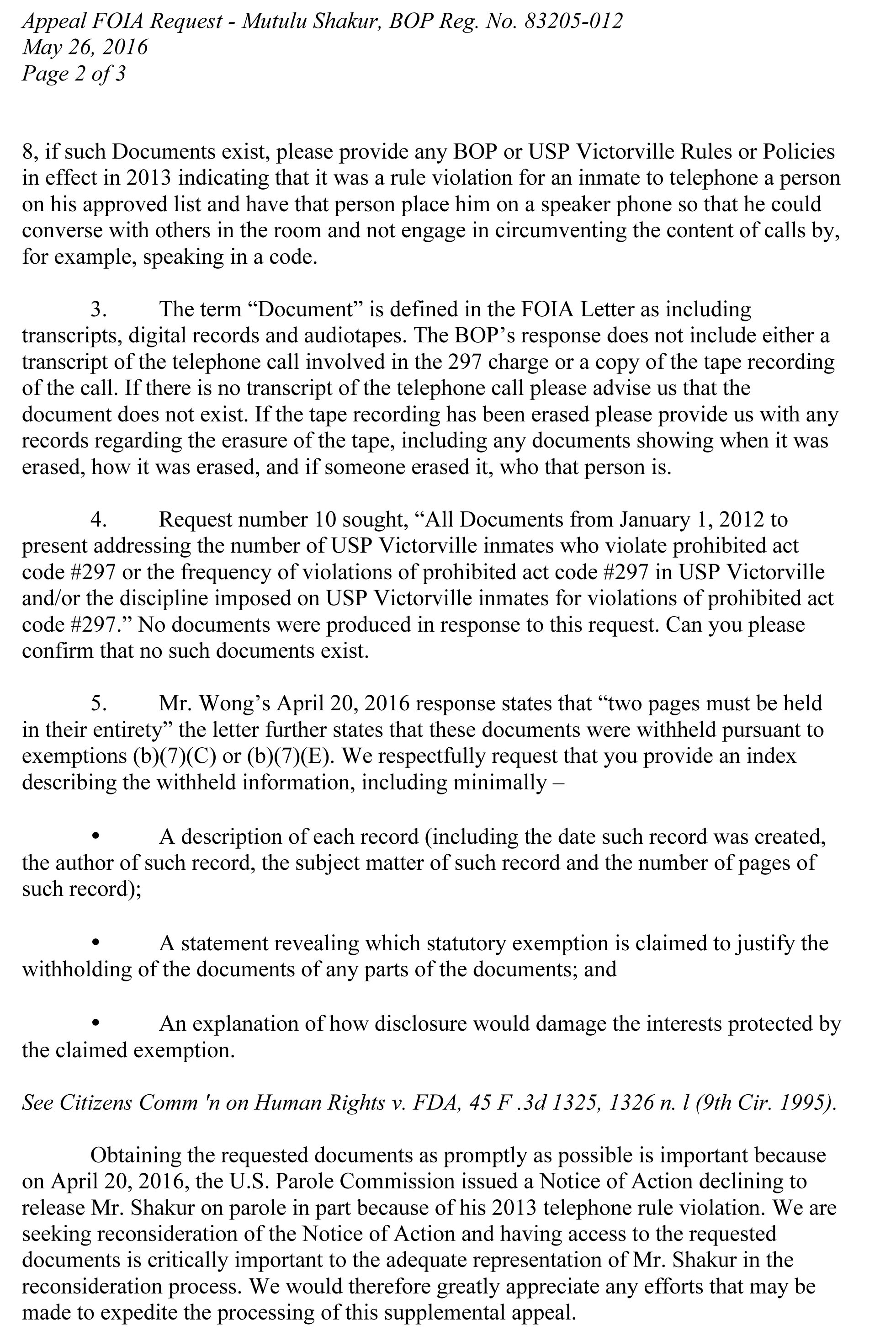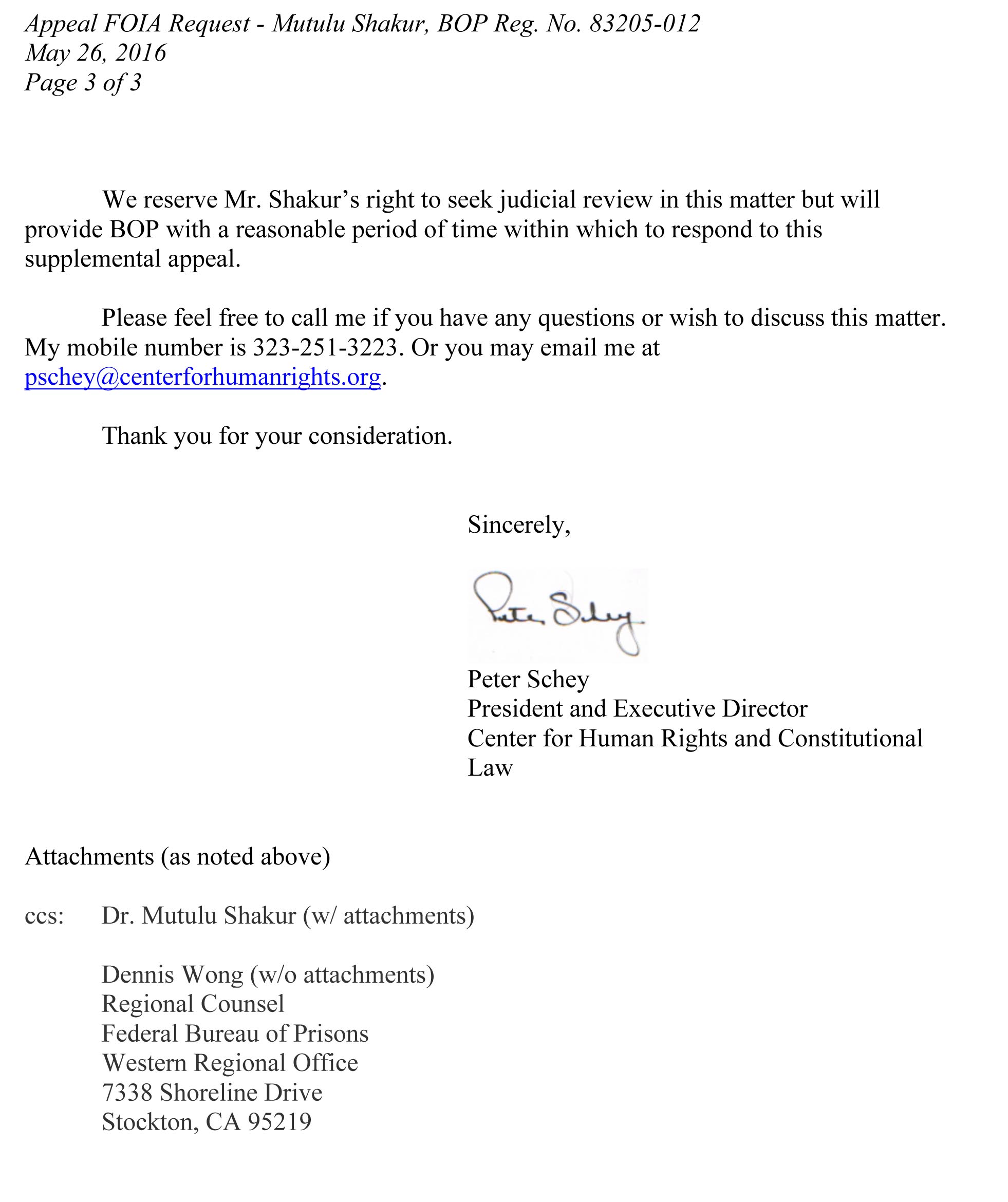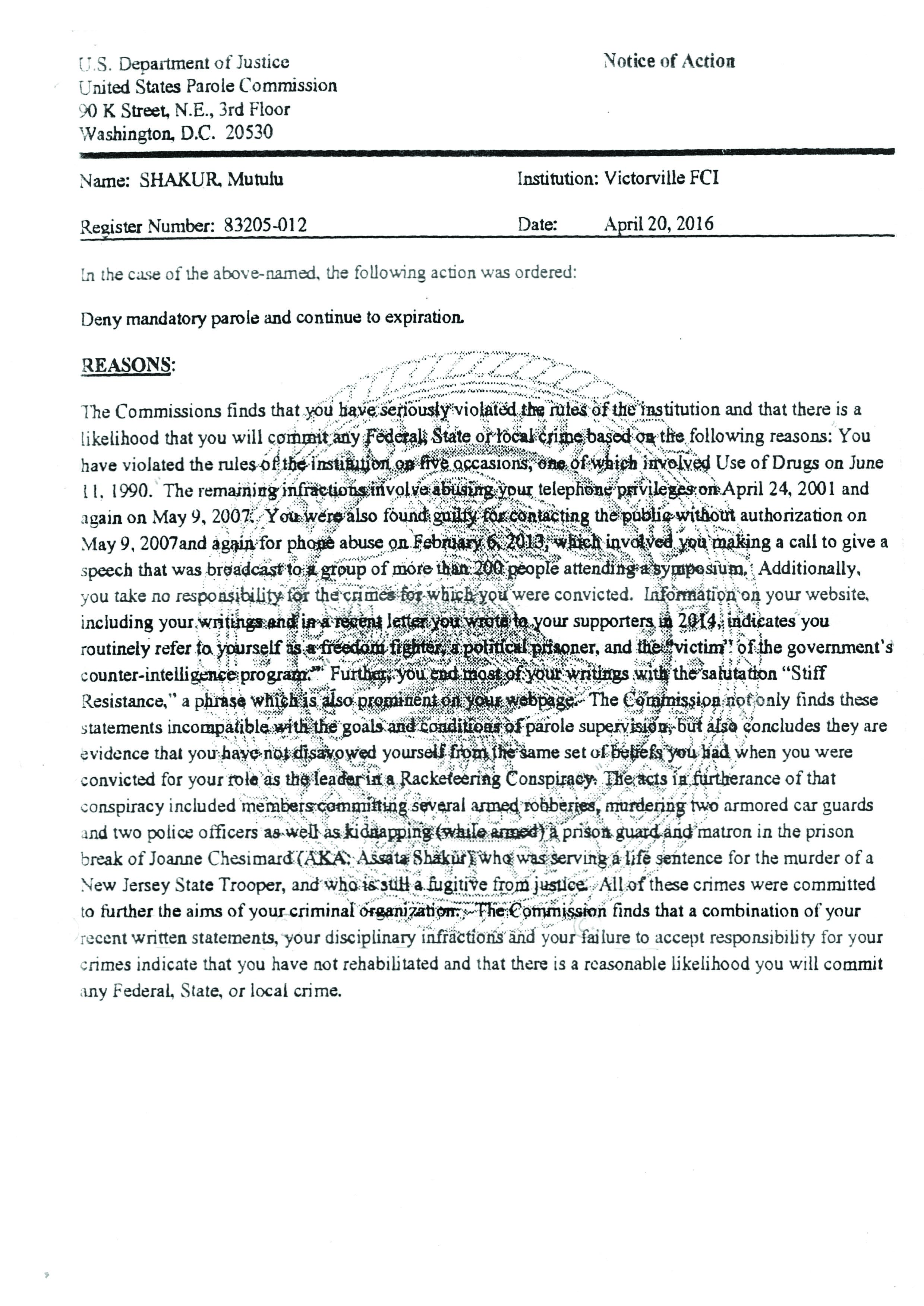Dear family and friends and supporters,
Like many of you, I was of the belief that I was to be released from prison, effective February 10, 2016. That belief was based on the 30 years I was required to serve. I have fulfilled that commitment while following all rules and regulations like any other prisoner would be expected to. Having been sentenced under federal statute 4205(a), any person serving more than 45 years must serve 30 years to receive mandatory release.
For the past 30 years my target release date has been February 10, 2016. Whosoever had legitimate concerns had the same time to come forward to argue that I should not be released.
To deny me release at this stage the Parole Commission must determine that I have either “repeatedly or seriously violated the rules of the institution, or there exists a great probability that the inmate will commit any federal, state or local crime following his release.”
The Parole Commission’s function is now limited in scope. The idea is that the society as a whole is represented by the Parole Commission. Hopefully the broader society has embraced a willingness to heal and move towards reconciliation. We have an obligation to ensure that the Parole Commission’s process is informed, fair, impartial and as unbiased as possible.
Many of the individuals that have opposed my release and question my resolve to be a productive member of society have had the benefit of mainstream media to project their views. I have endured the disadvantage of not having that benefit. My story has not been heard through the mass media. But I hope my call for reconciliation has been heard by some, and has had an impact, especially on young people.
What we have been tasked with is difficult and victory will have been hard fought. This is yet another stage of the struggle, but also an opportunity for our voices to be heard. I am hoping your messages can be shared with the Parole Commission as it makes a decision regarding my release or further incarceration.
Incarceration can be a catalyst to produce individuals that emerge with a newfound moral compass. I have been privileged to witness that growth and development in many other prisoners throughout my incarceration. As a result, there have been many good works produced, both inside and outside of these walls.
I would not be who I am today without all of you and I can only hope to have been a positive influence in your lives and in the lives of young men who have been incarcerated with me. It will be helpful to gather your thoughts and memories of our experience, and to share your sincere observations with the Parole Commission.
Please feel free to circulate this letter and my request to others who have had similar experiences that they would like to share.
Please address letters to the Parole Commission [specific instructions are below] but email them to both my attorney Peter Schey at [email protected] and my family at [email protected] for review before they are forwarded to the Board. I will not be personally reviewing letters.
My son Tupac acknowledged in the context of the struggle to overcome oppression that, “we’ve come so far, but still have so far to go …” To that I say, we must continue to be guided by the essence of our circumstances that has brought us to these points; which encourage us to be principled, honest and continue to search for the truth
Brotha Kendrick Lamar taught us “to pimp a butterfly.” From that we must always remember that we can evolve and to have faith in the power of transformation, that has been evident throughout the saga of our journey.
I thank you in advance for your continued love and support.
-Dr. Mutulu Shakur
BACKGROUND: CONTROLLING LAW
(A) A prisoner (including a prisoner sentenced under the narcotic addict rehabilitation act, federal juvenile delinquency act, or the provision of 5010(c) of the youth correction act) serving a term or terms of five years or longer shall be released on parole after completion of two-thirds of each consecutive term or terms or after completion of thirty years of each term or terms of more than 45 years (including life terms), whichever comes earlier, unless pursuant to a hearing under this section, the commission determines that there is a reasonable probability that the prisoner will commit any federal, state, or local crime or that the prisoner has frequently or seriously violated the rules of the institution in which he is confined. If parole is denied pursuant to this section, such prisoner shall serve until the expiration of his sentence less good time.
(B) When feasible, at least 60 days prior to the scheduled two-thirds date, a review of the record shall be conducted by an examiner panel. If a mandatory parole is ordered following this review, no hearing shall be conducted.
2.53-01 REVIEW PROCEDURE
(A) Upon receipt of a progress report from the institution prior to the “two-thirds” date, an examiner panel shall conduct a record review. A recommendation to parole normally should be made in order to provide a period under supervision for all except those who have the greatest probability that they will commit any federal, state, or local crime following release. A parole should not be recommended, however, for prisoners who have seriously or frequently violated the rules of the institution.
(B) Unless mandatory parole is ordered on the basis of the record review, the case should be placed on the next hearing docket for a mandatory parole hearing. If the regional commissioner disagrees with a panel recommendation to grant mandatory parole on the record, he may order that the case be heard as originally scheduled. If paroles not recommended following such hearing, the examiner panel may recommend any such action as may be appropriate.
(B) The commission shall furnish the eligible prisoner with a written notice of its determination not later than twenty-one days, excluding holidays, after the date of the parole determination proceeding if parole is denied such notice shall state with particularity the reason for such denial.
(C) The commission may grant or deny release on parole notwithstanding the guidelines referred to in subsection (a) of this section if it determines there is good cause for so doing: provided, that the prisoner is furnished written notice stating with particularity the reason for its determination, including a summary of the information relied upon.
*Italics indicate my emphasis
BACKGROUND: ANALYSIS OF SECTION 4206(D)
Section 4206(D) should be interpreted in connection with statutory framework of the parole act. The act provides for both discretionary and mandatory parole. An inmate with a life sentence becomes eligible for parole after serving 10 years in prison. Section 4205(a) release may be granted in the commission’s discretion based on a variety of factors, including the seriousness of the offense, whether the individual has substantially observed the rules of the institution, and whether parole would jeopardize the public welfare Section 4206(a). If parole is denied, the prisoner receives additional discretionary parole consideration every two years.
Under Section 4206(d) the commission (must) parole an inmate who served 30 years (unless) it determines he has seriously or frequently violated institution rules and regulations or…there is a reasonable probability that he will commit another crime. (This is crucial…) In establishing different criteria for discretionary and mandatory parole, congress necessarily intended the commission view the grant of mandatory parole under section 4206(d) through a different and more lenient lens than discretionary parole.
The legislative history of the act supports this view. This section provides more liberal criteria for release than the discretionary parole provision and requires the commission to consider efforts that the prisoner may have made to improve his education, skills, or personal attributes.
Surely, a prisoner who was granted a “discretionary parole” – even though now taken away – is even more eligible to be released on mandatory parole after they have served 30 years. Anyone sentenced 45 years or more, including those sentenced to any life term or other terms, who has not been released by any other applicable laws shall be released after the service of two-thirds or 30 years of such sentence. The math is computed on the basis that 45=30.
INSTRUCTIONS FOR ADDRESSING AND MAILING YOUR LETTERS
If you are able to write a parole support letter, please address it to the Parole Board (Case Operations, U.S. Parole Commission, 90 K Street, N.E., Third Floor, Washington, D.C. 20530), but please ONLY email them to [email protected] and [email protected] so that they arrive as soon as possible and no later than March 7th to be reviewed. Because the Commission considers whether there is a reasonable probability that he will commit another crime this can be addressed in your letter.
- Please type on letterhead
- Date the letter
- Add a subject line such as “In regards to: Dr. Mutulu Shakur #83205-012”
- Begin your letter with “Dear Honorable Members of the Parole Board:”
- Include biographical information such as your name, age, occupation (if you have been employed in the same field for some time, note that in your first paragraph) and relationship with Dr. Shakur or how you know him.
- Describe why you believe he deserves the chance for parole, such as positive activities while incarcerated such as education and mentoring other inmates, as well as his positive attitude.
- Mention if there is any specific way(s) you intend to provide support once he is granted parole (housing, employment, healthcare, etc.).
- Generally, these are the subjects that letter writers may want to cover:
- Include a short acknowledgment about Mutulu’s conviction. Basically that the author knows that he was arrested in 1986 and eventually convicted of conspiracy to commit serious and violent crimes based on circumstantial and informant testimony. The prosecution never argued that these crimes were committed for greed or personal gain. Letters should not defend or justify the alleged conduct that led to the convictions, but in the writer’s own words acknowledge that s/he is aware of the conviction and the severity of the allegations.
- Explain that these are different historical times and for many years while in prison Mutulu has never engaged in illegal or violent conduct. He has maintained relationships with family, friends and colleagues outside the prison. He has suffered a stroke while in prison in February 2013. He has also throughout his prison term maintained a commitment to the struggle for justice for people of color.
- If Mutulu is released, he will be a productive member of society. He’ll contribute to efforts to help the poor and those who are marginalized. He is highly unlikely to violate the terms of parole. He will in no way be a threat to the public safety.






 Ear Acupuncture – $15-25 Sliding Scale Donation
Ear Acupuncture – $15-25 Sliding Scale Donation Sunday, February 7, 12pm – 4pm
Sunday, February 7, 12pm – 4pm